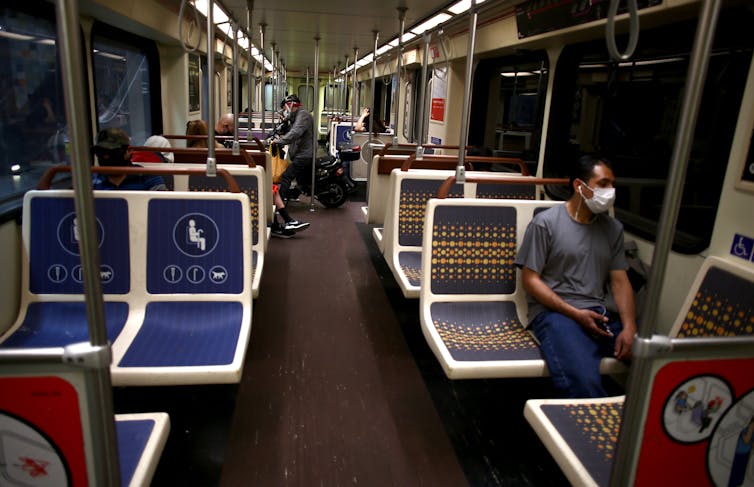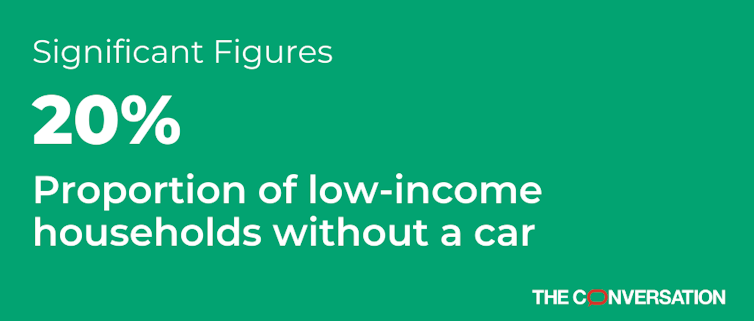Congress included allocations for transit in the CARES Act, but cities said it won’t be nearly enough, writes Ramya Vijaya.

By Ramya Vijaya
Stockton University

 Low-income Americans have borne the brunt of the coronavirus pandemic. They may also get left behind in the recovery.
Low-income Americans have borne the brunt of the coronavirus pandemic. They may also get left behind in the recovery.
Steep declines in ridership during the crisis have pushed public transit systems across the U.S. into deep financial distress. Though Congress included allocations for transit in the CARES Act, cities said it won’t be nearly enough. Even major systems in large metro areas like New York City and Washington, D.C., have serious concerns about long-term survival without more sustained support.
Failure of transit systems would be a disaster for the large proportion of low income households that depend on buses and trains to get to work and elsewhere – not only in urban areas, but in rural ones too.
I’m currently in the middle of a two-year study of transport inequality in the U.S. One of my early findings is that about 20 percent of the poorest households don’t own a vehicle. That would make them entirely reliant on public transportation, compared with 6 percent for all households.
For my study, I looked at the income and vehicle data from 2013 to 2017 for households in the bottom quintile of the income distribution in each of the country’s 709 commuting zones, which represent local economic clusters.
In urban areas, 21 percent of these low-income households didn’t have a single vehicle. In rural areas, it was slightly lower but still significant at 16 percent. The share without a car varied widely among states, from over half of the poorest households in New York to just 6.8 percent in Utah.
Dependence on transit also mirrors the deep racial inequalities in America. Almost a third of low-income African American households didn’t own a vehicle. Even among black households of all income levels the share without a car is very high at 16 percent.
Even before the present crisis, America’s inadequate transport infrastructure was being seen as a driver of inequality, limiting access to jobs, education and other services for poorer households. Higher unemployment rates and longer duration of joblessness had also been linked to limitations in transit access in certain regions of the country.
If cities and states have to drastically cut back public transportation availability over the long term, it could exacerbate these inequalities. Higher-income households with access to cars will be able to more easily return to their commutes as the crisis eases. And those who, prior to the outbreak, used mass transit might be more weary of returning to the subways and buses, which would worsen the funding problems.
Any long-term disruptions, however, will bring devastating isolation to a large number of low-income households across the country. Their ability to get to work or even look for work once the lockdown ends will be severely hampered if transit systems are not adequately supported to maintain at least pre-crisis service levels.
Ramya Vijaya is professor of Economics at Stockton University.
This article is republished from The Conversation under a Creative Commons license. Read the original article.
Please Donate to Consortium News.
Before commenting please read Robert Parry’s Comment Policy. Allegations unsupported by facts, gross or misleading factual errors and ad hominem attacks, and abusive or rude language toward other commenters or our writers will not be published. If your comment does not immediately appear, please be patient as it is manually reviewed. For security reasons, please refrain from inserting links in your comments, which should not be longer than 300 words.

Mass transit is more a city (urban) requirement than a state-wide system. To report it as a state-by-state problem is very misleading. Having lived in Boston and traveled to many meetings in DC and having lived in NJ (where all transport is to NYC and nowhere else, except stations along the way) mass transit is used by all but those politicians with limousines or helicopters. Commutes by cars are infuriatingly bad and there’s no cheap places to park. But to argue that federal taxpayers should fund the very limited urban network running from DC to Boston (used mostly by the non-poor), and somehow that $25 billion for mass transit belongs in a Coronavirus bill, seems an act of desperation. Stick such a bill on the bottom of the Military Appropriations Act along with all the other pork like a good Patriot!
Only poor people use mass transit? That’s depressing.